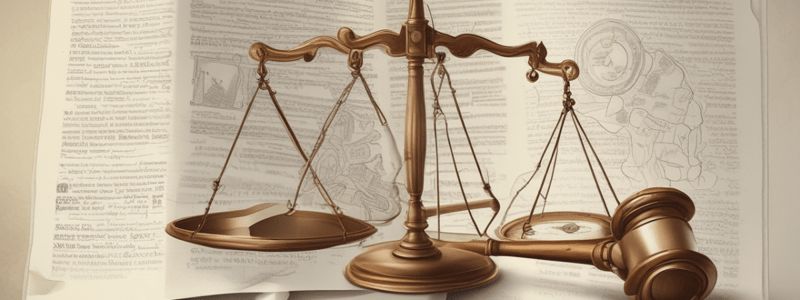Podcast
Questions and Answers
Quais são as implicações do princípio da legalidade no processo penal?
Quais são as implicações do princípio da legalidade no processo penal?
- Protege contra interferências arbitrárias do Estado.
- Garante a não aplicação de legislação ex post facto.
- Exige atos processuais específicos para acusar alguém de um crime. (correct)
- Permite procedimentos de acusação mais flexíveis em relação ao acusado.
Como o Ministério Público deve proceder se um crime foi cometido fora de Portugal e de suas águas territoriais?
Como o Ministério Público deve proceder se um crime foi cometido fora de Portugal e de suas águas territoriais?
- A investigação é realizada pela polícia local, não pelo Ministério Público.
- Não há possibilidade de ação legal nesses casos.
- Pode acusar o indivíduo sem a necessidade de apresentar provas.
- Deve provar a existência de mandado de prisão internacional. (correct)
Qual modelo de acusação é seguido em Portugal de acordo com o texto?
Qual modelo de acusação é seguido em Portugal de acordo com o texto?
- Modelo misto.
- Modelo inquisitório.
- Modelo acusatório.
- Modelo formular. (correct)
Em que consiste o princípio da legalidade no processo penal?
Em que consiste o princípio da legalidade no processo penal?
Qual é a importância do princípio da legalidade na jurisdição internacional?
Qual é a importância do princípio da legalidade na jurisdição internacional?
Qual é o princípio fundamental do direito penal português que garante a justiça e a previsibilidade?
Qual é o princípio fundamental do direito penal português que garante a justiça e a previsibilidade?
De acordo com o princípio da legalidade, qual das seguintes afirmações é verdadeira?
De acordo com o princípio da legalidade, qual das seguintes afirmações é verdadeira?
Qual é a origem histórica do princípio da legalidade?
Qual é a origem histórica do princípio da legalidade?
Qual dos seguintes elementos NÃO faz parte do princípio da legalidade?
Qual dos seguintes elementos NÃO faz parte do princípio da legalidade?
Em que país o princípio da legalidade tem uma forte fundação na common law?
Em que país o princípio da legalidade tem uma forte fundação na common law?
Flashcards are hidden until you start studying
Study Notes
Principle of Legality in Criminal Law
The principle of legality is a fundamental legal concept that ensures fairness and predictability in criminal law. It requires that any criminal penalty imposed must have been specifically authorized by statute or common law, and that it cannot be arbitrary or capricious. In Portugal's Penal Code, this principle is known as the princípio da lei (principio da lei) and plays a crucial role in shaping the country's criminal justice system.
To understand the importance of the principle of legality, we must first examine its origin. The principle dates back to Roman law, where it was formulated as the rule against retroactive laws. This rule stated that any new law enacted after a crime had already occurred could not be used to punish the offender, unless such punishment was explicitly allowed by existing law.
In modern times, the principle has evolved to include several key elements:
- Legality: Actions that are not expressly prohibited by law are considered permissible.
- Prohibition of Arbitrariness: Considerations of morality or utility do not justify violating an individual's rights and freedoms.
- Subsidiarity: The State may only intervene when necessary; legal actions taken by individuals should always remain possible.
Legal History
United Kingdom
The principle of legality has a strong foundation in English common law. One of the most celebrated cases that upheld the principle was R v Turley, where Lord Acton's famous statement that "power tends to corrupt absoluteness, that absolute power corrupts absolutely" played an instrumental role in emphasizing the need for strict regulation of government authority.
Portugal
Portuguese constitutional law recognizes the principle of legality as a cornerstone of democracy. Article 17.1 of the Portuguese Constitution states that "[n]o one can be held liable for conduct that was lawful at the time it took place," thereby ensuring that citizens are not subjected to ex post facto legislation.
This principle also extends to protect human dignity, with the Preamble of the Portuguese Constitution stating that "[d]ignity, which is inviolable and impervious, is guaranteed." Article 27 of the Constitution further elaborates that "everyone has the right to respect for their private life," while Article 28 guarantees protection from arbitrary interference by the state. These provisions illustrate the significance of the principle of legality in protecting individual liberties.
European Union
In the European Union, the Charter of Fundamental Rights of the European Union does not mention the principle of legality directly. However, Articles 2 and 7 protect the principles of legality and proportionality. The Charter itself states that "[a]ny person whose rights and freedoms guaranteed by this Charter are violated shall have remedy before national courts and bodies set up by law".
Article 47(1) provides for the right to an effective remedy before national courts and tribunals, whereas Article 47(2) specifies that the right to a fair trial includes the possibility for everyone to obtain a review and correction of administrative decisions affecting them.
Impact on Criminal Procedure
The principle of legality has significant implications for criminal procedure. For instance, whereas some countries apply a formulary approach, meaning that they require specific procedural acts to charge someone with a crime, others follow the accusatorial model, which allows for more flexibility in charging procedures.
In Portugal, criminal proceedings may only be initiated based on the principle of legality. For instance, if a criminal offense is committed outside Portugal and its territorial waters, the Public Prosecutor's Office must prove that there are grounds for an international arrest warrant. This demonstrates the principle's application in international law and its impact on the jurisdiction of foreign courts.
In conclusion, the principle of legality is a fundamental legal principle that lies at the heart of fair and predictable criminal law. By upholding the principle, criminal justice systems can protect individual rights and promote fairness in the administration of justice.
Studying That Suits You
Use AI to generate personalized quizzes and flashcards to suit your learning preferences.


